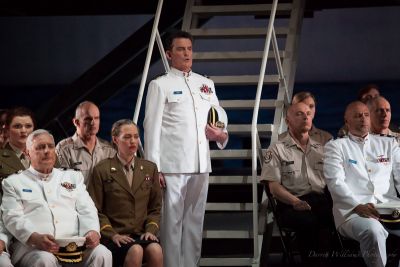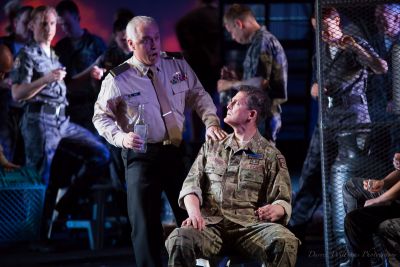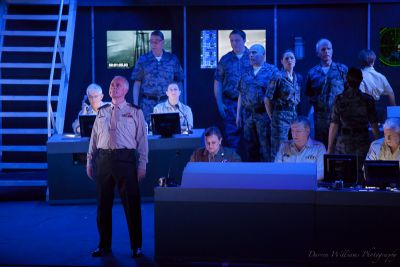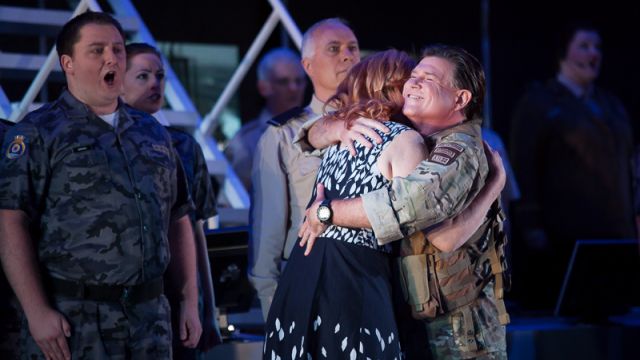Otello
Top marks to State Opera of South Australia for yet another programming milestone. Never afraid to schedule little-known or challenging works – witness Dead Man Walking, and this year's Philip Glass Trilogy – they are now giving Adelaide opera-lovers the rare chance to see a seldom-performed late masterwork by Giuseppe Verdi.
And what a masterpiece it is, with its tense, pared-down psychological-thriller libretto by Arrigo Bioto, and its glorious, shimmering score by Verdi. This production opened at Adelaide's Festival Theatre on Saturday night, and is a musical and vocal triumph for State Opera and the Adelaide Symphony Orchestra.
Stage director, Simon Phillips, has chosen to set the opera in a present day war-zone, on an aircraft carrier, brilliantly designed by Dale Ferguson, and providing a claustrophobic modern equivalent for Shakespeare's isolated Venetian garrison at Cyprus. Control room monitors show images of modern conflicts, and cctv consoles provide clever opportunities to exploit the concept of surveillance so essential to this drama of furtive suspicion.
Where the production concept doesn't work so well is by making the chorus all sailors aboard the aircraft carrier, rather than Cypriots. This means that there is no real "them-and-us" relationship between locals and an occupying force, making Cassio's drunken fight with Montano such a danger to a fragile peace. It also affects Desdemona's position. She is no longer isolated in a practically all-male environment. This Chorus is not foreign to the Venetians, and unavailable to Desdemona, but, instead, all fellow ship-mates , and "on the same side" as her. Granted, with Emilia a sailor, too, Desdemona is, perhaps, the only civilian on the ship, but she is no longer the only other female.

What may be considered controversial by some is the production's choice to play Otello as white, rather than Boito's "Moorish general in the service of the Republic of Venice". However, the device is understandable in the present age. Shakespeare's play's more expansive and subtle text explores Iago's ability to work his evil by playing on Othello's insecurity because of his foreignness. The opera, with its pared-down libretto, focusses much more on the single idea of Otello's jealousy.
The surtitled translation used by State Opera seemed to have removed all of the librettist's references to Otello being "the Moor", even though they were still being sung by the characters. It is (thankfully) now impossible to perform Shakespeare's play with white actors in "black-face". Understandably – because of the very specific vocal casting demands – this is less easy to achieve with opera. So, one can completely understand the decision to maintain the singer's own nationality and skin colour, and to play Otello as a man driven by jealousy to murder a loving wife.
But, what the production then needs to do is find some other way of creating Otello's "otherness" or "apartness", which renders him so dependent upon, and susceptible to, Iago's outrageous insinuations.
It also needs to, still, portray him as someone exotic, and a magnificently heroic warrior, whose fall from grace provides the tragedy. Sadly, in both these respects – the modernisation and ethnicity decisions – I felt that the production let Bradley Daley down, and robbed him of much of his deserved sense of epic grandeur and ultimate tragedy. The language which he has to sing is still heroic, and matched by the extraordinary range and virtuosity of the score. And, yet, the production has him stuck behind computer screens and control panels, when the music and language have him raging about blood. Daley's is a truly powerful, heroic voice, but also capable of great tenderness. He was particularly affecting in his soul-baring Act 3 aria of grief over the loss of Desdemona, and his final moments over the murdered Desdemona.

The Adelaide Symphony Orchestra, under the baton of Brad Cohen, gave a sublime reading of what is considered Verdi's greatest score, from the stunning opening chords of the storm at sea, through all the various textures of massive ensembles, intimate solos and duets, to the final pianissimo notes as Otello dies upon a kiss. One of the constant joys and privileges of attending State Opera productions is to hear our magnificent State Orchestra play.
Similarly, the State Opera chorus was superb in conveying the score's varying moods of terror and excitement in the storm, exuberance after victory, adoration of the governor's wife, and horror at her public shaming.
Douglas McNicol, as Iago, was a monumental presence, both physically and vocally, and especially so in the terrifying nihilistic "Credo" in Act 2. He and Bradley Daley performed the great Act 2 "temptation" scene with enormous tension and subtlety.
Miriam Gordon-Stewart was heartbreakingly beautiful in Desdemona's exquisite "Willow" song and "Ave Maria" in Act 4 – an unforgettable moment in the production. She and Daley worked wonderfully together in their ravishing Act 1 love duet, the Act 3 "handkerchief" argument, and the final confrontation and murder.
Catriona Barr, as Iago's long-suffering wife, Emilia, was especially affecting in her final Act scene with Desdemona, and her powerful confrontations of Otello and Iago. Bernard Hull was an engaging Cassio, excellent in his drunkenness, and in his fight with Thomas Millhouse's properly outraged Montano.

As well as the arias and duets, another of the great strengths of the production was its ensembles , such as the quartet between Otello and Desdemona, Iago and Emilia, and culminating in the great Act 3 humiliation ensemble, which saw the addition to the production's musical landscape of the powerfully-sung Lodovico of Pelham Andrews.
My issues over some aspects of the production in no way diminished my overall impression of its power and dramatic force. New interpretations are always important, because they make us ask questions which take us further into the complexities of great works of art. And this, Otello certainly is. My thanks again to State Opera, and the entire musical and production teams for giving us a chance to experience this masterpiece in Adelaide.
For anyone who loves opera, make sure you don't miss it.
Rob Croser
Images: Darren Williams Photogrphy
Subscribe to our E-Newsletter, buy our latest print edition or find a Performing Arts book at Book Nook.

